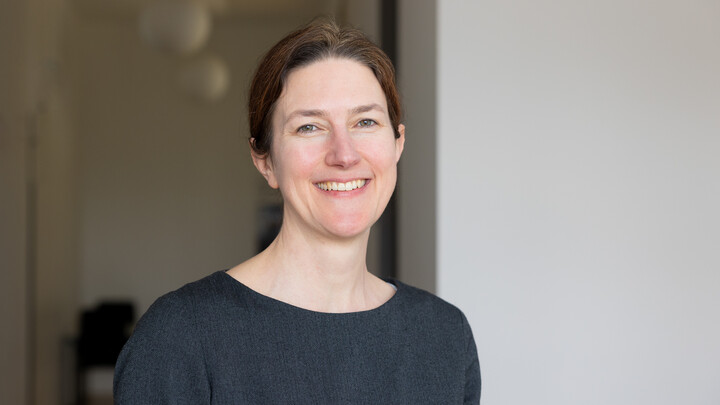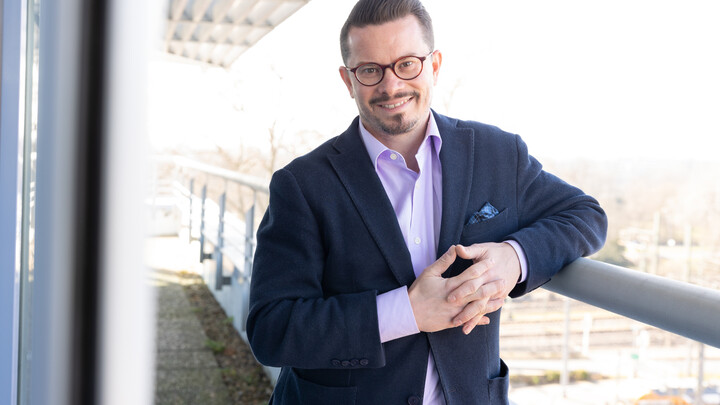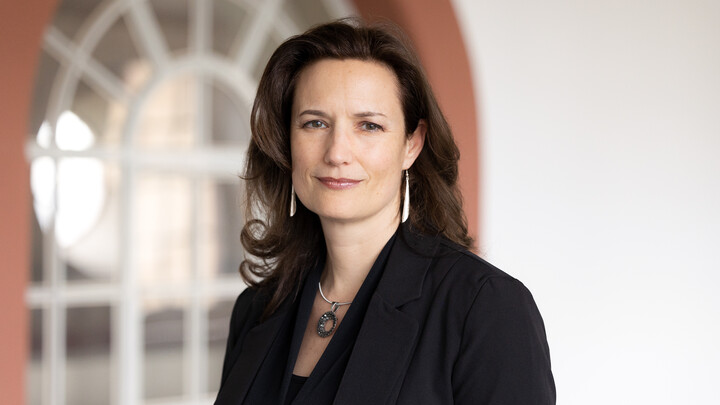Welcome at the University of Mannheim
Professor Nicole Altvater-Mackensen
Chair of Psycholinguistics, English and American Studies

How do babies learn their first words? What do they notice when someone speaks to them? And how do children use information like movements of an interlocutor's eyes or mouth to understand and acquire language? Professor Nicole Altvater-Mackensen's research focuses on these questions of early childhood language acquisition and processing. Altvater-Mackensen, who assumed the Chair of Psycholinguistics in September 2022 as the successor to Professor Rosemarie Tracy, is primarily interested in how infants and young children perceive language.
She uses a number of different methods to learn about infant cognition, including eye tracking and electroencephalography (EEG), which measures brain activity. In a recent study, she tested how two- to four-year-olds learn new words while being reading aloud to and found that the children remembered the new word forms better if they looked at the reader more frequently during the reading. Her research findings play an important role, for example, in the promotion of early childhood language development.
Altvater-Mackensen's work defies a strict assignment to any one discipline: She started out working in linguistics before turning to psychology and then neuroscience, and now she works in English and American Studies. “I'm very interdisciplinary in regard to my methods and theoretical approaches,” said Alvater-Mackensen, a native of Düsseldorf. “This new position in Mannheim offers me an ideal forum to develop these interests fully.”
Research interests:
- Early childhood language acquisition
- Relationship between speech production and perception
- Influence of multilingualism on linguistic representations and their processing
Selected stations:
- 2020–2022: Visiting professor of English and American Studies at the University of Mannheim
- 2017–2022: Assistant professor of Developmental Psychology at Johannes Gutenberg University Mainz
- 2015–2016: Visiting professor of Psychology of Language at the Georg-Elias-Müller-Institute of Psychology in Göttingen
- 2012–2015: Research associate at the Max Planck Institute for Human Cognitive and Brain Sciences in Leipzig
Professor Nicolas R. Ziebarth
Chair of Labor Markets and Social Insurance, Economics

In 2021, after years of public debate in the United States, the introduction of the “Healthy Families Act” sought to ensure up to seven paid sick days per year to employees nationwide. The draft of this bill was based in part on the research findings of the German economist Nicolas Ziebarth, who was a professor at Cornell University at the time. In July 2022, Ziebarth moved to the University of Mannheim, where he now holds the Chair of Labor Markets and Social Insurance in the Department of Economics. He is also head of the research unit “Labour Markets and Social Insurance” at the Leibniz Centre for European Economic Research (ZEW). “Mannheim has always been my dream destination because the university and city of Mannheim stand out in economics—not only in terms of Germany, but in all of Europe,” he explained.
Ziebarth has been dealing with the topic of sick pay since graduate school. He studied business administration and economics and was interested from the very beginning in how labor market policies and public health are related. At the moment he is pursuing this interest in the context of a new project investigating how closely private health insurance in Germany reaches the theoretical optimum for coverage. Another project focuses on benefits received in Germany for a reduction in earning capacity (Erwerbsminderungsrente): Drawing on a variety of data, Ziebarth is analyzing, for example, how many people in Germany turned to private occupational disability insurance after the public system of coverage collapsed in the first decade of the new millennium and how politicians might improve regulation of the private disability market.
Born in Frankfurt, Ziebarth has earned a number of recognitions for his research. In 2022, the global economist network RePEc (Research Papers in Economics) listed him 65th among all economists worldwide with less than 15 years of research. And in 2021, the Handelsblatt listed him 12th among all German-speaking economists under 40.
Research interests:
- Labor Market Economics
- Health Economics
- Risk Economics
Selected Stations:
- 2017–2022: Associate Professor (W2/tenured) at Cornell University in the USA
- 2011–2017: Assistant Professor (W1) at Cornell University in the USA
- 2006–2011: Doctoral candidate and research associate at the German Institute for Economic Research (DIW) in Berlin
Professor Kristin Kersten
Chair of Multilingualism and Education

What is the best way to learn a language? What are the advantages of instruction in two languages? Can bilingual teaching principles be transferred to language-sensitive instruction for multilingual children? And how might language-sensitive strategies improve cognitive activation in all learners? For the last 20 years, Kristin Kersten has been working to answer these fundamental questions. She is currently part of two interdisciplinary research projects on the influence of social circumstances and schools on learners' cognitive and linguistic development, especially when acquiring multiple languages. Her particular focus: the quality of linguistic input and cognitive stimulation in both foreign-language and German-language instruction. “My research to date has shown that these principles can counteract educational disadvantages,” she reported, adding that “these are very important findings for teaching our increasingly heterogeneous classes.”
In the context of these projects, conducted in close cooperation with colleagues from the fields of educational and developmental psychology, Prof. Kersten and her team have developed and tested an observational method for implementing language-sensitive instruction that promotes cognitive activation. It is used both for research purposes and as a tool in teaching. Among other aspects, the projects involve systematically collecting and archiving video footage of classroom instruction, an activity she plans to continue and expand upon in Mannheim. “Videos provide excellent opportunities for the analysis and illustration of academic and subject-specific issues. They are easily accessible for students,” the linguist continued. She is particularly invested in the early involvement of students in developing research questions and academic projects. What she finds most attractive about working in Mannheim is the stimulating interdisciplinary research environment that incorporates the fields of psycholinguistics, the well established focus on research into multilingualism, and the educational sciences, including their focus on classroom research.
Research interests:
- Cognitive, social, and school-related variables of language acquisition
- Multilingualism and multilingual education
- Bilingualism and emotions
- Bilingual instruction ('Immersion'/'CLIL')
Selected stations:
- 2010: Junior professor of Foreign Language Teaching and Second Language Acquisition at the University of Hildesheim
- 2014: Continuation to W2 professorship in the Institute for English Language and Literature at the University of Hildesheim
- 2013–2015: Establishment and deputy management of the Hildesheim Center for Research on Education and Teaching (CeLeB, Research Support Office)
Texts: Yvonne Kaul, Jule Leger/
